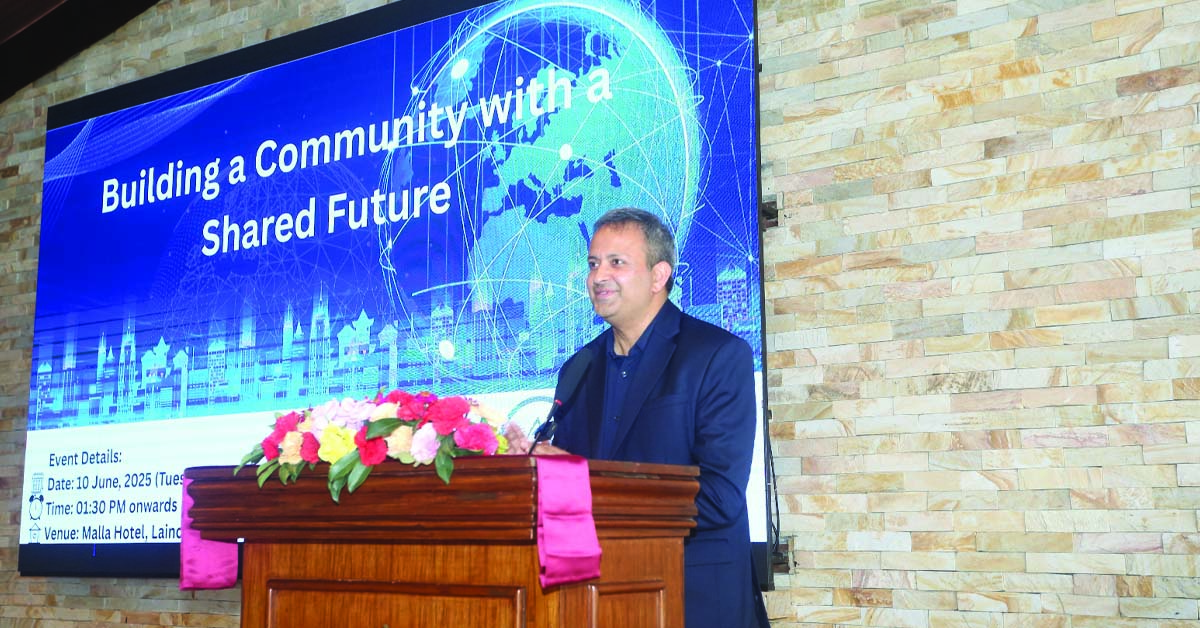
KATHMANDU: A seminar titled “Building a Community with a Shared Future” was held in Kathmandu on June 10, bringing together scholars, politicians, diplomats, and sinologists to explore the evolving role of political parties in fostering trust, cooperation, and shared values among neighboring countries, particularly in South Asia and China.
Organized in the backdrop of recent high-level visits and the Fourth Dialogue on Exchanges and Mutual Learning Among Civilizations in China, the seminar aimed to offer forward-thinking strategies for peaceful coexistence and regional collaboration.
The chief guest of the event, Damodar Bhandari, Minister for Industry, Commerce and Supplies, reflected on his recent official visit to China and underlined the practical importance of fully implementing agreements under the Belt and Road Initiative (BRI).
“The Belt and Road Initiative offers great opportunities for Nepal, but we must ensure these agreements lead to real, tangible development, not just remain symbolic,” he said. “Nepal’s strategic position between China and India is a strength. We must actively engage both neighbors to maximize our national interests.”
Similarly, Dr. Mahendra Bista, Executive Chairman of Nepal Television, shared insights from his recent visit to China, which offered an opportunity to witness the country’s rapid progress and deep-rooted cultural heritage.
“China’s remarkable development and cultural richness are inspiring. As Nepal, we must reflect on where we stand in our civilizational journey—what have we preserved, what have we achieved, and where do we go next?”
Dr. Kalyan Raj Sharma, General Secretary of the Friends of Silk Road Club – Nepal, said, “In a rapidly shifting geopolitical landscape, small and developing countries like Nepal must find ways to protect their national interests while contributing to a ‘Community with a Shared Future.'”
He highlighted that China’s vision of a shared future aligns closely with Nepal’s foreign policy objectives. He added, “The Community with a Shared Future for Mankind’ is not just a Chinese vision—it aligns with Nepal’s foreign policy and offers an inclusive framework for small nations like ours.”
Other speakers stressed the importance of sustainability, cultural diplomacy, and people-centered development.
Dr. Lila Nyaichyai, Head of the Central Department of Library and Information Science, cautioned against Nepal’s growing trade deficit and called for urgent attention to water resource management and green economy strategies.
“Addressing Nepal’s trade deficit is a national urgency. We must prioritize water resource management and green economy initiatives to ensure sustainable growth,” she said.
She also highlighted that cultural identity and language can be Nepal’s soft power in the international arena. “Language and culture are powerful tools of soft power. Nepal must actively promote and protect its cultural identity on the global stage.”
Dr. Uddab Pyakurel, Acting Director of the Global Engagement Division at Kathmandu University, stressed the importance of civilizational philosophies such as Confucianism and Buddhism in fostering regional cooperation.
“Globalization has often excluded voices from the Global South. Nepal must explore and adopt alternative frameworks that reflect its own aspirations,” he said.